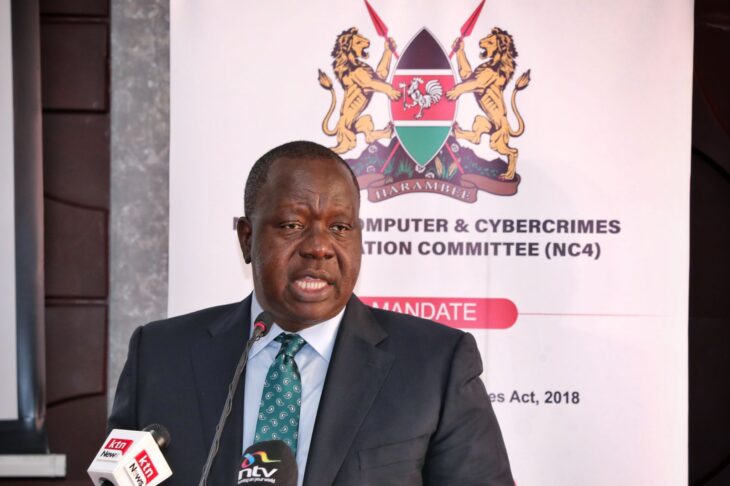NAKURU, Kenya, Jun, 8 – Senior security chiefs and digital experts have converged in Naivasha to fine tune the cyberspace security strategy to protect the country from emerging local and global threats.
Interior Cabinet Secretary Dr. Fred Matiang’i described the strategy as critical in coordinating intelligence-based protection against threats and vulnerabilities to the country’s ICT infrastructure and systems. He said the new strategy will help deal with emerging global cybercrimes that pose serious investigative and prosecution challenges to security teams due to its evolving nature and the involvement of high level political and economic interests.
“We are dealing with all manner of cases of people operating either from our country or other countries, maligning or interfering with political systems. This strategy couldn’t have come at the right time, because it will enable us to start building capacities in our institutions to help police the cyberspace,” he said.
He was speaking in Naivasha during the launch of a three-day workshop for the National Computer and Cybercrimes Coordination Committee (NC4). He said the strategy will provide a platform for partnerships between the Government and the private sector to deal with shared threats.
“Cybersecurity is no longer going to be an issue for us in the security sector to deal with, or for institutions in the executive branch of government. We must build a very wide reach because no one is going to be left unaffected. This strategy puts us ahead as we ought to be.”
The CS singled out the abuse of technology in the country, and called for concerted action against internet vigilantism noting this has become endemic during the election period.
“The big debate now is how we are going to behave with each other. The era of fake news and unprecedented abuse of social media is here. Those who would like to exercise their freedoms in expression, in association, in supporting their preferred candidates and individuals will do so while taking into consideration the welfare of the whole of society.”
Dr. Matiang’i defended the Huduma Namba project, and expressed his dismay that it has been delayed through court processes.
“We are better off building systems that collate and coordinate this data and information and develop a single source of truth than scattered data sets across the board. The drive for Huduma Namba is important and very crucial, and is one way towards moving us to a much more protective, clearer and reliable basis of operation.”
The establishment of the Computer Misuse and Cybercrime Act of 2018, that commenced on 30 May 2018 provides a platform for public policies to ensure security and safety of information systems.
The Act details offences relating to computer systems such an unauthorized access or interference, cyber espionage, cyber harassment, cybersquatting, false publication of data, identity theft and impersonation, child pornography, phishing, computer fraud, computer forgery, unauthorized disclosure of passcodes, fraudulent use of electronic data, and cyber terrorism.
Want to send us a story? Contact Shahidi News Tel: +254115512797 (Mobile & WhatsApp)


